SUMMARY
This is AI generated summarization, which may have errors. For context, always refer to the full article.
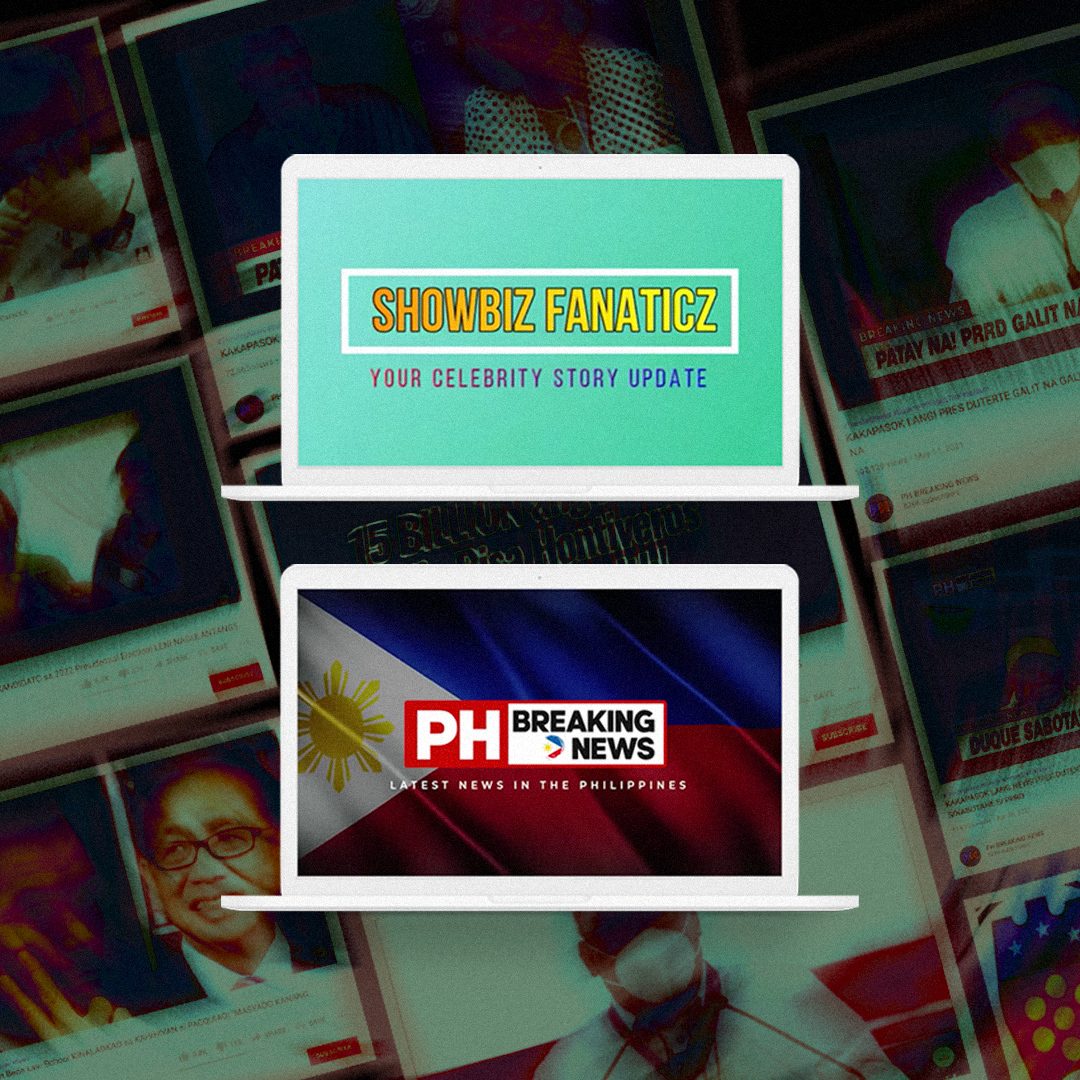
At a glance
- A number of Youtube channels that have been previously fact-checked by Rappler label themselves as channels specifically for celebrity or trending news updates when, in fact, they mostly publish political content.
- One channel, which Rappler has fact-checked at least 41 times, started out with celebrity and entertainment updates then shifted towards political content that includes false and misleading information on political figures.
- Since YouTube lacks a policy on disinformation, this practice of channels using celebrity content as a way to build an audience puts people who seek entertainment on the platform at risk of being served political disinformation.
- A strong celebrity and entertainment culture in the country allows these channels to thrive, an academic says. People who are vulnerable to their tactics include the elderly, first-time voters, and marginalized groups.
Showbiz Fanaticz. Your celebrity story update.
This is the text displayed in the usual title card of YouTube channel Showbiz Fanaticz, a channel that has published 2,410 videos for nearly two years since January 2020. Ironically, the channel’s uploads mostly feature political figures, not celebrities.
The channel did start out with videos on celebrity news, but over time its videos took a turn towards the political. Not only did Showbiz Fanaticz start posting hyperpartisan “news” updates, it also started posting blatant disinformation.
Rappler has fact-checked Showbiz Fanaticz at least 41 times, as of writing. These false or misleading videos have gained over 3.4 million views cumulatively, as of the time they were respectively fact-checked. The channels’ videos have gained 205.1 million views as of September 17.
It is just one of many channels that are known to be purveyors of false and misleading information on the platform. Using natural language processing on video titles, Rappler tracked the habits of other dubious channels in sowing political disinformation while claiming to serve celebrity and supposedly trending news content.
If left unchecked, YouTube channels that put up a showbiz front may work insidiously to perpetuate false narratives or revise history. Just recently, actress Toni Gonzaga interviewed former senator Bongbong Marcos on her YouTube show and allowed him to spew lies unchecked on her channel, which has over four million subscribers as of writing. The Marcoses also figure as subjects in some of the showbiz channels Rappler looked into.
Top social media platform in the Philippines
Disinformation on Youtube is of particular concern given that, by the third quarter of 2020, it had become the most popular social media platform in the Philippines. Among internet users, 97.2% access the platform, according to a Statista report published on August 5, 2021.
Comparatively, active users of Facebook, the previous favorite, only comprised 96.8% of active internet users for the same quarter.
The Philippines also remains the top in social media and internet usage worldwide, according to the Digital 2021 report released by advertising firms We Are Social and Hootsuite in January.
What is especially worrisome is that YouTube does not label these fact-checked videos on its platform. This means viewers will have no way of knowing that they are being fed with lies.
Under pressure for its failure to curb disinformation and conspiracy theories particularly in relation to COVID-19, YouTube released on August 25 a policy blog on how it is tackling misinformation.
The policy blog, however, still stops short of establishing a process of flagging content with false claims. Instead, Youtube chief product officer Neal Mohan only reiterated their policy on raising authoritative content, arguing that “an overly aggressive approach towards removals would also have a chilling effect on free speech.”
Intrigue, drama, showbiz culture
Mohan claims that “hot-button content” doesn’t perform well on YouTube, “especially compared to popular content like music and comedy.”
But what if that line gets muddled?
People who seek entertainment on YouTube are then at risk of being served false information, specifically those related to politics.
“We like intrigue and drama from the showbiz news, and we also like to see that in our politics, so that’s what I see these YouTube channels are trying to play at,” said Emy Ruth Gianan, an instructor at the Polytechnic University of the Philippines – College of Social Sciences and Development, in a Zoom interview with Rappler in August.
In response to a follow-up email in September, she said there are parallels between the entertainment news tradition of creating “intriga” for promotion purposes and disinformation campaigns. Both are motivated by either profit or ideology or partisanship.
In a conference presentation entitled “Marcos’ Historical Distortion in the Digital Space: YouTube and alternative political influence networks,” professors Cheryll Soriano and Fatima Gaw said that pro-Marcos content creators use keywords and categories on YouTube to position themselves in spaces for news, education, and entertainment despite their videos not offering such content.
They said the ambiguous way these creators engage in political discourse “enables them to move between these categories, depending on which advances their political agenda.” By making these pro-Marcos creators’ narratives visible, YouTube has a hand in normalizing them and undermining those that contest their accounts.
What dubious channels post
Rappler looked into the videos of 21 YouTube channels from which we had fact-checked at least one video. Seven of these channels contain words related to celebrities, trends, or news in their channel names.
One channel, PH BREAKING NEWS, has around 571,000 subscribers, as of September 17. PH BREAKING NEWS has also been fact-checked by Rappler multiple times.
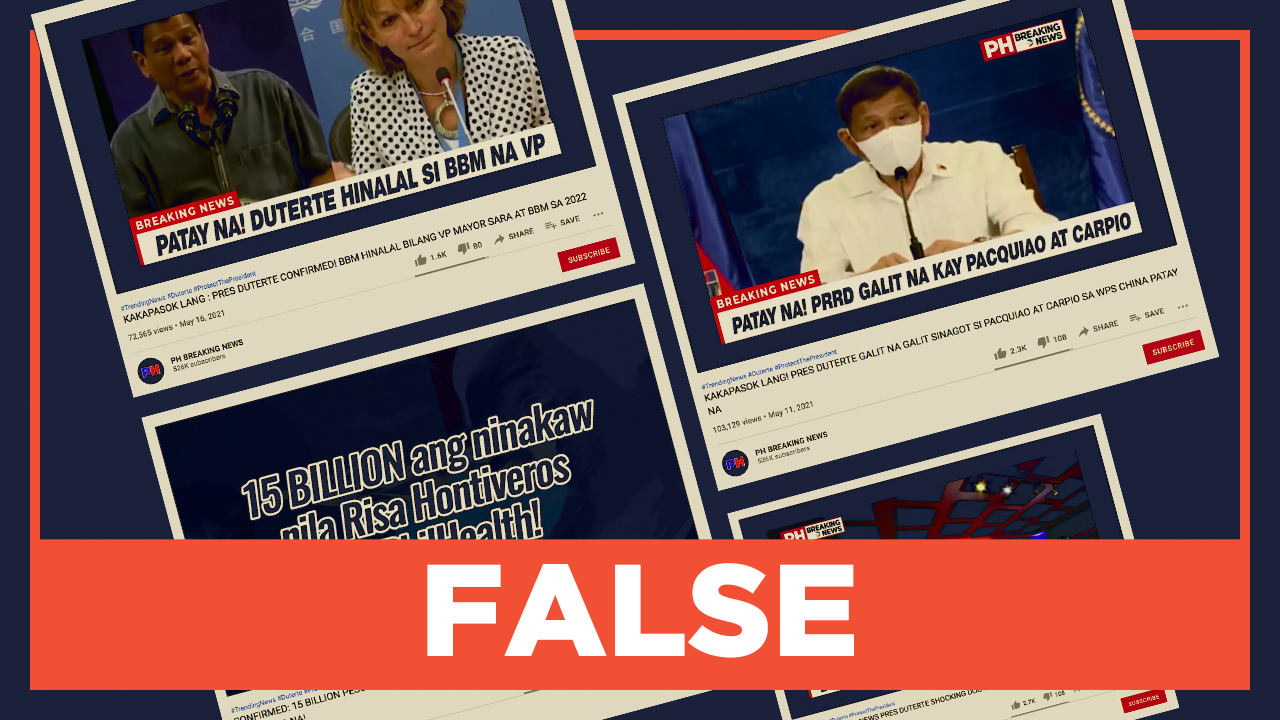
Of these channels, the biggest is Showbiz Fanaticz, having posted 2,122 videos from January 4, 2020, to June 3, 2021. Showbiz Fanaticz also produced the most videos under the tags of critics and perceived enemies of the government, celebrities, national politics and political figures, local politics and political figures, international relations, and overseas Filipino workers (OFWs).
As the interactive graph below shows, Showbiz Fanaticz’s posts in the early months of 2020 were mostly about celebrities. It started mixing up the celebrity content with politics beginning April 2020, when ABS-CBN was fighting for its franchise.
Its most commonly used words in video titles include ABS-CBN, President Rodrigo Duterte, and Vice President Leni Robredo, among stars like KC Concepcion, Nadine Lustre, and Angel Locsin.
Another repeat disinformation peddler, Robin Sweet Showbiz, which describes itself as “the office of tsismis (gossip),” also has Duterte, Leni, and even “dilawan” and “DDS” in its most-used keywords. It shows a similar trend of starting with miscellaneous posts before dramatically shifting to political content.
To arrive at this conclusion, Rappler used Sharktank, its tool for gathering data on the digital information ecosystem in the Philippines, in order to get all other videos published by those channels. Sharktank is a database that tracks publicly posted content on Facebook. It allows cross-referencing each Facebook post with Rappler’s fact checks as well as statistics on YouTube videos.
Using natural language processing, the channels’ video titles were clustered into different categories. These clusters were further refined to reflect the emerging themes relevant to the study, concerning claims about national and local politics and political figures, state forces, foreign countries, conspiracies, celebrities, critics and perceived enemies of the government, and OFWs. “Other posts” are videos that do not fall under these clusters.
Local context
In her paper entitled “Disinformation trends in Southeast Asia: Comparative case studies on Indonesia, Myanmar, and the Philippines,” Gianan observed that one of the common disinformation trends among the three countries is that “deep-seated narratives serve as bases for disinformation.”
In the Philippines, this means that disinformation is rooted in a strong celebrity and entertainment culture, Filipinos’ distrust for mainstream media, and the structure of our educational system, which Gianan thinks is lacking when it comes to building the foundation of critical thinking.
She added that our frustrations with our political and social institutions make us resort to social media and public shaming. “It is largely attributed to the fact [we are slow to resolve] cases. We look for alternative news sites because we think that we cannot trust existing mainstream news or media outfits,” she said.
A number of videos from Showbiz Fanaticz falsely claimed that opposition figures would be jailed. They include Senator Risa Hontiveros, former senator Antonio Trillanes IV, and Makabayan bloc representatives Carlo Zarate and Sarah Elago. One video also falsely claimed that President Duterte’s administration would arrest former International Criminal Court prosecutor Fatou Bensouda.
One of its most far-reaching false videos said former Philippine Health Insurance Corporation president Ricardo Morales and Senator Hontiveros would be imprisoned for corruption in the agency. It had gained 190,928 views on YouTube and 256,000 views from a repost on Facebook when it was fact-checked.
Gianan noted how these channels create videos to attract audiences – novelty and clickbait headlines, the use of colloquial Filipino, voiceover that sounds like the usual news anchors and therefore sound authoritative, as well as a “clever use of color and layout…red, strikingly bold letters, images of known personalities [are juxtaposed].”
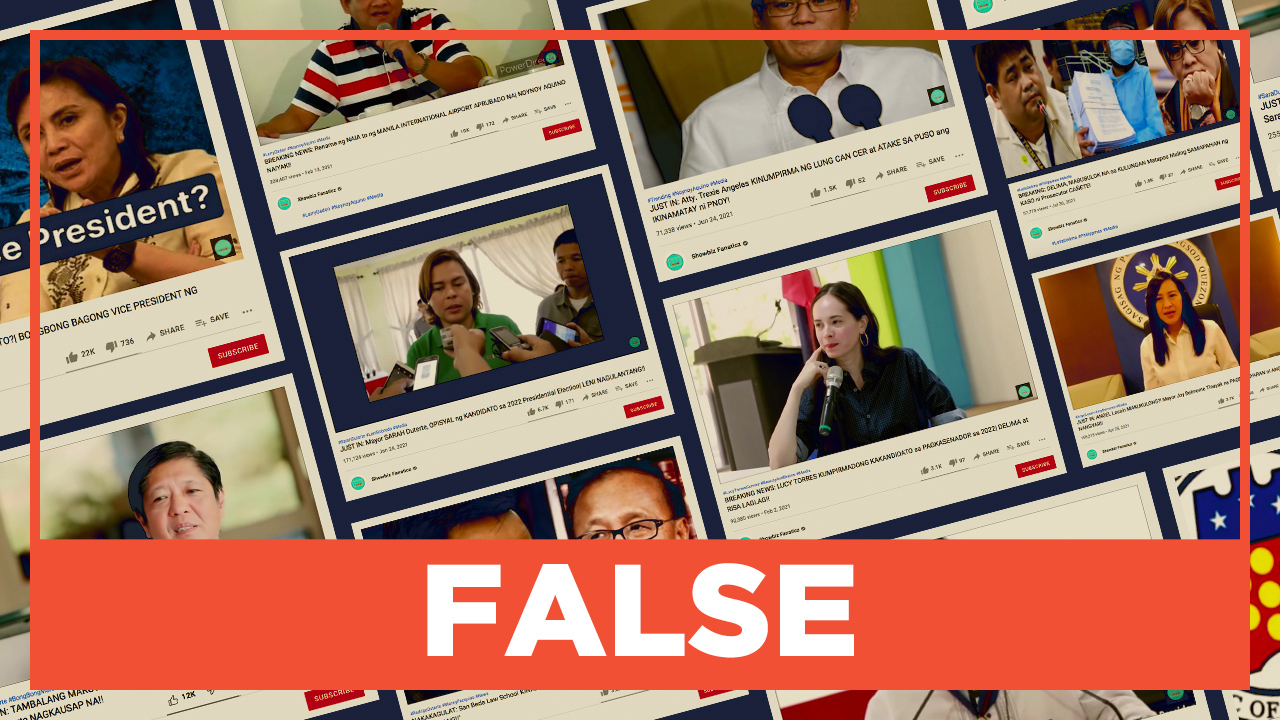
Potential impact on the 2022 elections
Exploiting the power and influence of celebrities to perpetuate disinformation is hardly a new tactic, but it becomes more dangerous on a platform with policies that allow disinformation to thrive.
Who would be at risk of consuming this?
Gianan said three groups would be vulnerable. The first includes people who are new to social media or do not have enough skills to navigate them. This includes the elderly.
Second, Gianan said, this kind of disinformation tactic would affect people who are newly interested in learning more about the country and our current events, and want to develop a keen understanding of politics. This includes first-time voters.
Third, marginalized groups would be even more vulnerable.
As far as the upcoming elections in 2022 are concerned, Gianan and Jozon Lorenzana, assistant professor at the Ateneo de Manila University Department of Communication, think the direct impact of these channels remains to be seen, but they have the potential to affect the outcome.
“[Look] at these videos as potential ways where political messages during elections will be conveyed. That’s what we can say for now. You can more or less anticipate that YouTube will be one of those messaging platforms during the elections, especially so, that elections in 2022 will be conducted mostly through online communications because of the pandemic,” Lorenzana told Rappler in a Zoom interview in June.
“Our spaces for dissent and deliberative engagement become limited. So basically, overall, its impact would be, while it doesn’t directly affect vote shares, it numbs our civic responsibility and shrinks civic spaces,” Gianan said in a mix of Filipino and English.
How to respond to disinformation on YouTube
According to YouTube’s policies, if a channel receives three strikes for violating community guidelines, it gets terminated. However, Showbiz Fanaticz remains on YouTube, despite its history of repeatedly uploading videos with false content, likely because its false content does not fit under any of YouTube’s specified prohibited spam and deceptive practices.
The number of subscribers that Showbiz Fanaticz has is not public, but it is a verified channel. Channels can apply for verification when they have at least 100,000 subscribers.
Politicians are competing for space on the social media battleground even as early as now, and we can expect political camps to ramp up propaganda once certificates of candidacy are filed in October.
How can Filipinos arm themselves against the rampant, unchecked disinformation on YouTube?
Lorenzana renewed calls toward increased media literacy. “As an educator, I think my default kind of suggestion is to continue the efforts to educate people how to assess claims…. This is something that…requires the effort of different institutions – not just schools, but also society as a whole, family, businesspeople, the Church, and media,” they said.
“We should be more ready for more advanced or tricky tactics that could be employed, especially [leading into] the 2022 elections. There will be more – most likely, they will use even more drama, more unique statements to hype a certain message, a certain disinformation campaign that they are playing on, and to continue to pollute the information space,” Gianan said in a mix of English and Filipino.
YouTube did not directly respond to Rappler’s queries through email in June on whether repeat disinformation peddlers Showbiz Fanaticz and PH BREAKING NEWS had been reported, evaluated, or sanctioned. It only reiterated that the platform removes content that violates its Community Guidelines and that it raises up authoritative content.
As we have seen, YouTube’s Community Guidelines do not explicitly prohibit false information. As more Filipinos go to YouTube as their source of entertainment and information, muddling the line between the two, political aspirants might just shape their strategy to exploit the platform’s blind eye to disinformation. – with reports from Dylan Salcedo/Rappler.com
*Lorenzana uses they/them pronouns.
Add a comment
How does this make you feel?




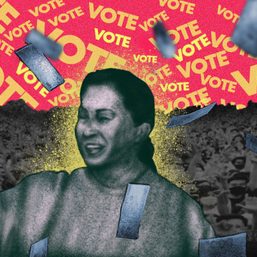

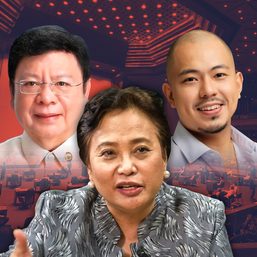




![[New School] Tama na kayo](https://www.rappler.com/tachyon/2024/02/new-school-tama-na-kayo-feb-6-2024.jpg?resize=257%2C257&crop=290px%2C0px%2C720px%2C720px)

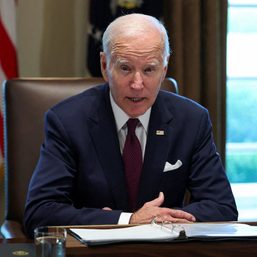
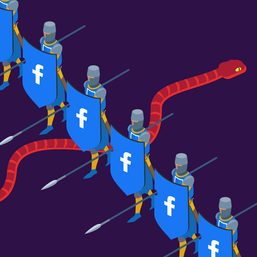
![[EDITORIAL] Ateneo shooting ang katumbas ng Capitol Hill siege sa Pilipinas](https://www.rappler.com/tachyon/2022/08/animated-social-media-real-world-violence-carousel.jpg?resize=257%2C257&crop_strategy=attention)


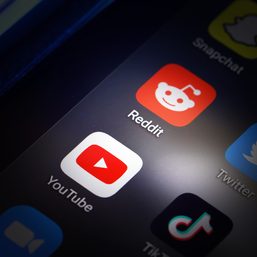
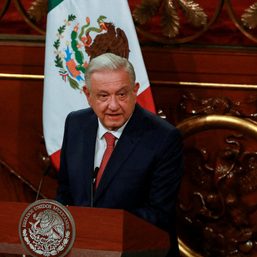

There are no comments yet. Add your comment to start the conversation.